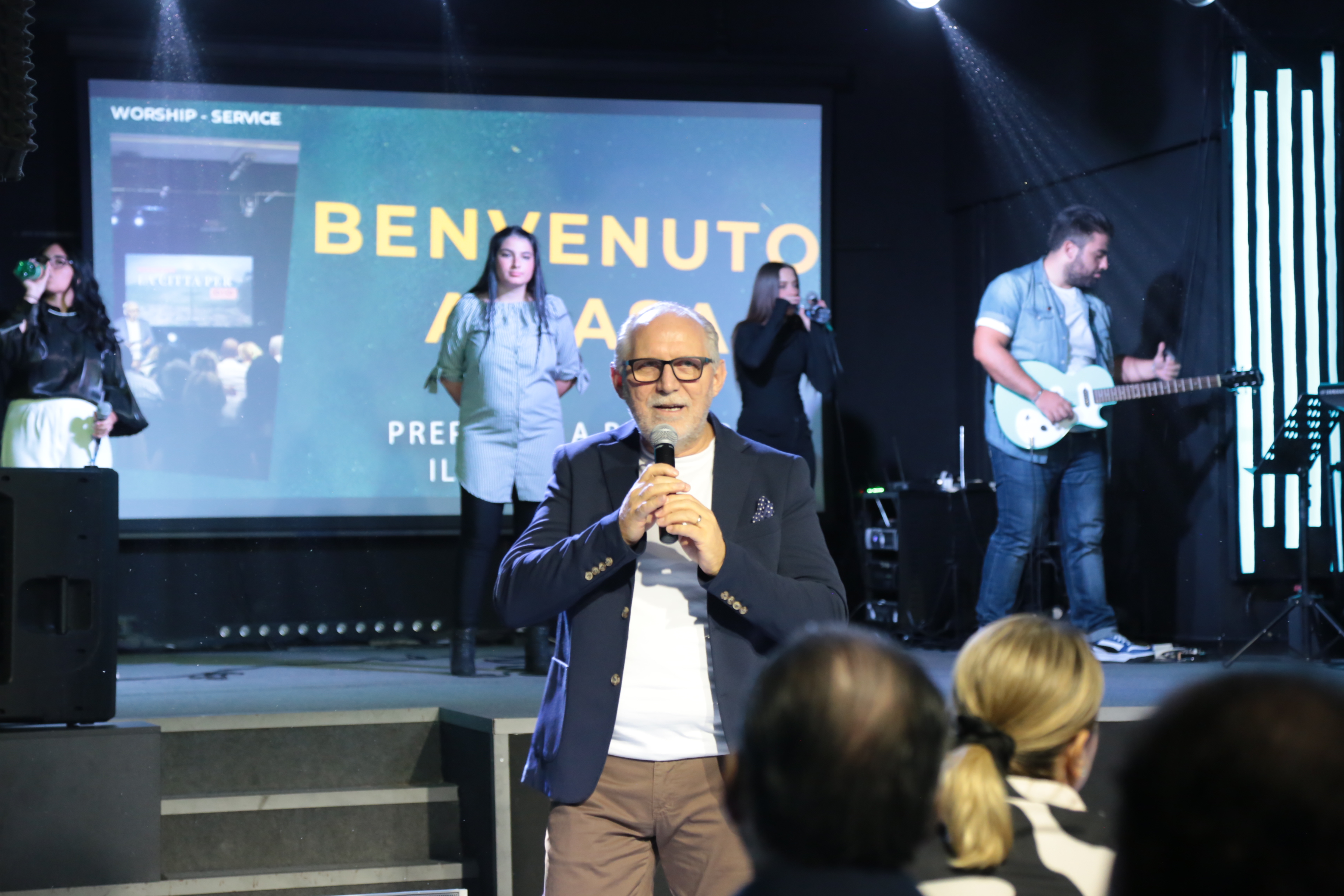Sufficient love and goodness
PREACHING OF SEPTEMBER 22, 2024:
Doctor Francesco Puccio
SUFFICIENT LOVE AND GOODNESS
Let’s start by reflecting on the message we are receiving today: the spiritual awakening that God desires to see in our lives, in our families, and in our city. This awakening is not merely an outward movement but a profound transformation that must begin in our hearts. God is calling us to prepare ourselves and to set up cradles to welcome His children, for in His grand plan, He desires to see our communities flourish, but it all starts with our willingness to prepare ourselves. God will not send children where there are no cradles ready, where there is no order, where the ground has not been plowed and purified. The cradles, which represent our lives, must be cared for by those who are capable of doing so, and we are called to this responsibility. If we want to be part of an awakening, we must start with taking care of ourselves, which means looking honestly at our souls, recognizing the areas where we need healing and growth, and allowing the Holy Spirit to work in us. The Word of God speaks to us of goodness and love, and we are called to manifest this goodness and love in our daily lives, in our families, and in our relationships. We cannot expect to see a change around us if we are not willing to change within us. God is patient, but He is also clear in His invitation: spiritual awakening begins with our willingness to be transformed, to be renewed in mind and heart. Only then will we be able to welcome the children God wants to entrust to us and be instruments of healing and restoration in the lives of others. Taking care of ourselves is not just a personal matter but an act of love toward others. When we allow God to work deeply in our hearts, we become people more capable of loving, forgiving, and serving. Goodness and love are not just concepts but concrete actions that reflect the nature of God; when these virtues become an integral part of our lives, we become active participants in the awakening that God is bringing.
Psalm 136:1; 1 O give thanks unto the Lord; for he is good: for his mercy endureth for ever.
God’s love is eternal and unchanging, and it is from this perfect love, which embraces and surpasses all human flaws, that we must begin; we must only ask ourselves if we have truly understood and embraced it in our lives. We often confuse goodness with merely fulfilling others' desires or offering help in times of difficulty, but while these are noble actions, true goodness, which comes from God, is not an abstract or superficial concept. God’s goodness goes beyond satisfying our momentary desires; it is a deep moral quality that involves doing good for others even when it entails sacrifice, discipline, and correction. We are called to reflect: how willing are we to live this divine goodness in our daily lives? God invites us to overcome the resentments and bitterness we have accumulated, to free ourselves from the burdens that prevent us from living in the light of truth. If there are conflicts in our families, if there are quarrels, disagreements, or hatred, that is where we must begin our process of healing. Forgiving those who have wronged us is a necessary choice, even though it is painful; we cannot expect to see a spiritual awakening without first setting our lives and hearts in order. God cannot send new believers into a community that is not healed, that has not yet learned to love and forgive as He loves us. How can we expect to heal those who are full of resentment if we ourselves have not yet freed ourselves from our own resentment? This is the crucial question posed to us today. When we talk about goodness, we are talking about something very deep. God’s goodness is what drives us to desire the good for others, even when this requires correction and sacrifice. Loving does not mean passively accepting everything, but means seeking the best for the other person, even if this involves difficulties and suffering in the short term, with a view to a greater and lasting good. This is true love, the kind that is not afraid to face the truth, even when it hurts. If we look back at our journey with God, we will see that His correction has always been for our good. Even in the most difficult moments, God has always worked to guide us towards maturity and spiritual growth, and we must be willing to do the same with others, with love and sincerity, because it is only in the truth that true love is found.
Hebrews 12:6; 6 For whom the Lord loveth he chasteneth, and scourgeth every son whom he receiveth.
So we too must be ready to receive God’s correction and embrace the process of transformation that He desires to accomplish in us, for although it may seem difficult and painful, correction is a sign of His love. Just as a father corrects his child for his own good, God corrects us to prepare us for something greater. We must recognize that without correction, there is no growth; without allowing ourselves to be shaped by God’s hands, we cannot mature or develop the character necessary to be useful instruments in His Kingdom. God loves us too much to leave us in our weaknesses and imperfections; His desire is to see us grow and become the best version of ourselves, the one that reflects His image. Therefore, when we talk about spiritual awakening, we cannot ignore the need to work on ourselves, because it is not only something that happens "around" us but, most importantly, "within" us. We are called to be instruments in God’s hands and to guide others by bringing light into darkness, but how can we do this if we are not willing to be transformed first? How can we expect to be caretakers of the cradles, to welcome new believers, if we ourselves are not ready? The transformation we wish to see in our city, in our community, and in our families must begin with us; we cannot expect God to work if we are still full of bitterness, resentment, and an inability to forgive, because these burdens hold us back and prevent us from experiencing the fullness of His love and grace. We must look to our own hearts, for that is where true spiritual awakening begins; it is not just a matter of external manifestations but a deep internal purification. This is the first step towards authentic transformation, a transformation that will bear fruit not only in our lives but also in the lives of those around us. We are called to be bearers of this change, but it all starts with our hearts, with our willingness to receive correction and embrace the transformation that God wants to accomplish in us.
Proverbs 13:24; 24 He that spareth his rod hateth his son: but he that loveth him chasteneth him betimes.
We too must be willing to receive correction and grow in discipline; we should not see this as an act of cruelty but rather as a profound sign of love. Just as a father corrects his child out of love and for his good, God corrects us with the same intent, desiring to see us mature, grow in our faith, and become people capable of living fully according to His purposes. This means we must embrace correction not as punishment, but as an opportunity to become better, to transform ourselves, and to advance in our spiritual journey. We cannot afford to be passive spectators in this process, because God did not create us to watch our lives pass by without participation, but to be active protagonists of our transformation. He calls us to examine our consciences, to pause and look within ourselves, recognizing the shadows that still reside in our hearts. What is preventing us from truly moving forward? Is it the resentment we hold towards a family member? Is it the bitterness we have accumulated from a past wrong? These are the questions we must ask ourselves, for if we truly want to see awakening in our lives and communities, we must be ready to let go of these burdens. We cannot expect awakening to happen while we are still bound by chains of resentment and anger, because awakening is not just a spiritual movement that happens around us, but a change that occurs within us. This change cannot manifest if we are not ready to forgive and free ourselves from what ties us to the past. Awakening is a liberation, a rebirth, but first we must let go of everything that weighs us down and prevents us from living in the fullness of God's love and grace. Discipline is another crucial theme in our faith journey, and the discipline we receive from God is necessary to strengthen us, to prepare us to bear fruit, and to become instruments in His hands. We must accept it with humility, knowing that He never desires our pain, but our growth. Just as an athlete trains to achieve a goal, we too must be willing to endure the hardship of the process, knowing that the final result will be a transformed life, a life that reflects the glory of God.
Deuteronomy 8:5; 5 Thou shalt also consider in thine heart, that, as a man chasteneth his son, so the Lord thy God chasteneth thee.
Now let’s get to the heart of the message, understanding that God corrects us because He loves us deeply, and that receiving this correction with humility is essential for our journey. It’s not just an act of paternal love, but a genuine process of transformation. God does not want us to remain as we are; He calls us to change, to become better, to overcome our limitations. Therefore, we cannot remain static because the Christian life is a journey of continuous becoming, and God pushes us to look at our weaknesses to work on them, but He doesn’t stop there: He also calls us to do the same with others. Being good does not mean being permissive or avoiding confrontation, but having the courage to speak the truth and correct when necessary, because only then will we see true transformation in the lives of those around us. To love does not mean accepting everything passively, but seeking the best for others, even if this requires short-term difficulties. We cannot wait for someone else to do it for us, because God has called us to take initiative and prepare ourselves for what He wants to do in our lives. God has given us all the tools to be effective in His Kingdom, but it is up to us to use them because we cannot settle for the minimum; He calls us to do more, to seek more, to desire more. This requires effort, discipline, and above all, the willingness to pay the price, for God has entrusted us with a responsibility: to be His representatives on earth. We are called to be ambassadors of His Kingdom, but how can we do this if we are not willing to be transformed? God calls us to perfection, but this does not mean being without flaws; it means being willing to work on our flaws, to grow in holiness, and to overcome our limitations. God loves us so much that He will not leave us as we are, because His love is so great that He desires to see us mature, grow, and become all that He has called us to be. But this growth is not automatic; it requires our active participation, acceptance of His correction, and willingness to work on ourselves. Being a disciple of Christ is not just about believing, but about following His example, living according to His teachings, and allowing His Word to transform us. The awakening that God wants to see in our city begins with us; we cannot wait for someone else to do it; we must take the initiative, prepare ourselves, care for the cradles, and welcome those whom God will send to us. But first, we must heal ourselves by freeing ourselves from resentment, bitterness, and hatred, and only then, when we are healed, can we be the instruments of the awakening that God desires to see. He has already equipped us with everything we need, but it is up to us to use the tools He has given us, to do the hard work, to look within ourselves and recognize our flaws so we can work on them. God is faithful and will fill the cradles we have prepared, but we must be ready and willing to do the necessary work to prepare ourselves; only then will we see the fruit of our labor. Let us conclude by saying that the return of Christ is near and the awakening is in progress, but it depends on us to manifest it because God has done His part and now it is our turn to do ours. If we want to see our city transformed, we must first transform ourselves. If we want to see the cradles full, we must be ready to care for them. If we want to see the awakening, we must be willing to do the necessary work to prepare for it. God is ready, and we?





























